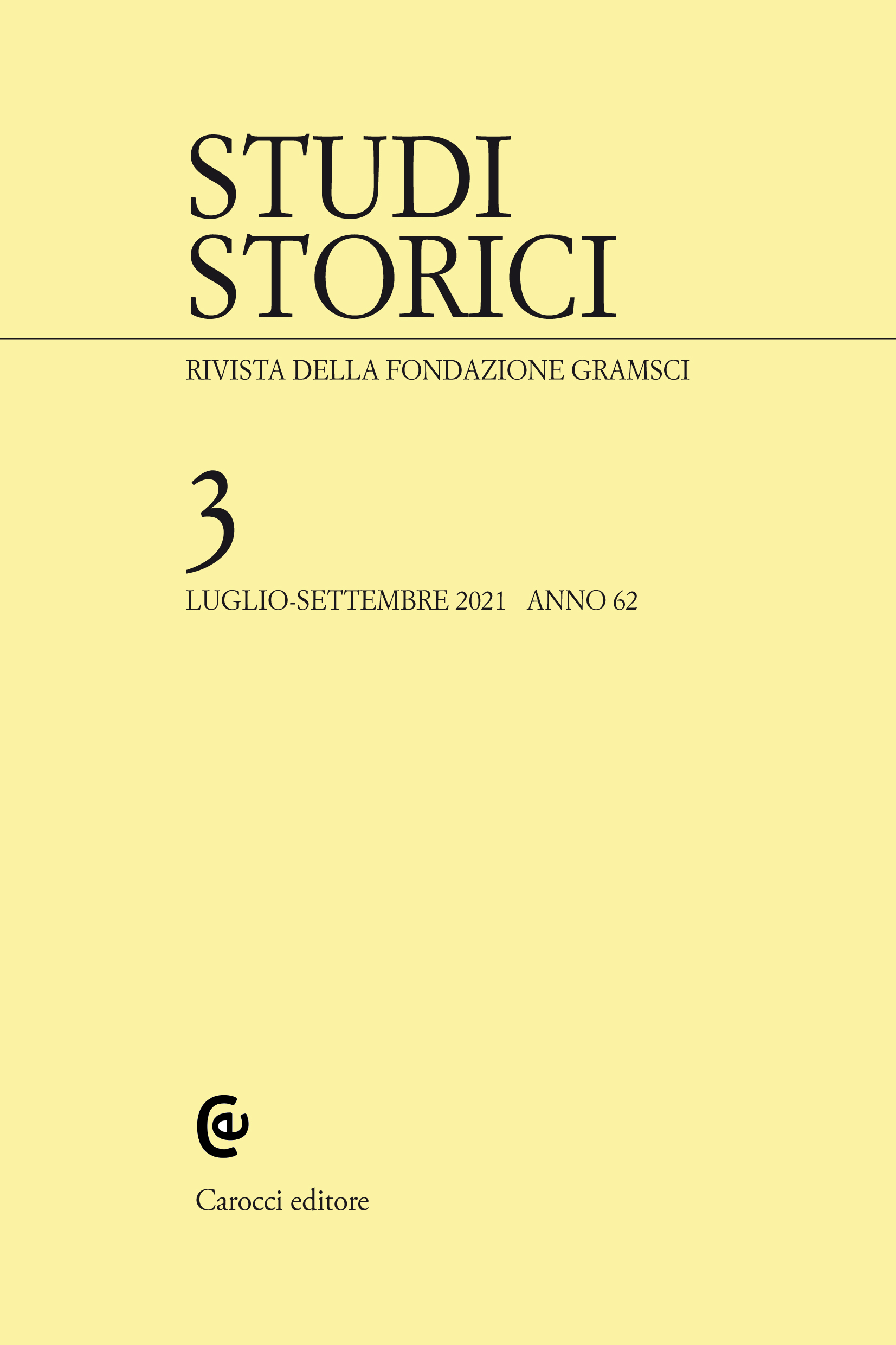
luglio - settembre 2021 anno 62
Sommario e abstract degli articoli
I beni degli eretici: modelli di gestione tra implicazioni politiche e ricadute socio-economiche della repressione nell’Europa medievale (secc. XIII-XIV)
Forum: Il ritorno di Martin Guerre
r.p., pp. 583-586
Premessa
Foreword
This text presents a panel of articles aiming to initiate a comparative research by distinct geographical areas on the role that heretics’ assets played in the early stage of a systematic and polycentric form of repression of religious dissent. Through an investigation conducted on published and unpublished sources, profound differences between one context and another can be detected, to the point of confirming a decidedly plural connotation of the Medieval Inquisition, while noting the existence of some common dynamics. In any event, a decisive role of the management of confiscation of heretics’ assets seems to emerge clearly not only in the evolution of the tribunal of faith, but in the development of an increasingly articulated network with civil powers and local contexts.
Keywords: Inquisition, Heretics, Assets, Local societies, Civil powers.
Parole chiave: Inquisizione, Eretici, Patrimoni, Società locali, Poteri civili.
Sergi Grau Torras, pp. 587-614
La confiscación de bienes a los herejes en la Corona de Aragón (siglo XIII)
The Confiscation of Heretics’ Goods in the Crown of Aragon in the 13th Century
This study analyses the confiscation of the goods of heretics condemned in the Crown of Aragon in the 13th century, through legislation, inquisitorial sentences and confiscation of heretical goods, lands and other properties. A summary is also provided with the number of cases documented per year, the cities where they took place, all the names of the condemned heretics, the total amount of fines, a list of expropriated properties, and the names of the new property owners. Lastly, a quantitative global view of the impact of the confiscation of the goods of condemned heretics in the Crown of Aragon in the 13th century is provided.
Keywords: Heretics, Heresy, Crown of Aragon, Inquisition.
Parole chiave: Eretici, Eresia, Corona d’Aragona, Inquisizione.
Riccardo Parmeggiani, pp. 615-642
«Teneatur insuper potestas seu rector omnia bona hereticorum […] dividere tali modo». Dialettiche istituzionali, modalità di gestione ed effetti delle confische sulle società comunali
«Teneatur insuper potestas seu rector omnia bona hereticorum […] dividere tali modo.» Institutional Dialectics, Management Methods and Effects of Confiscations on Communal Societies
Starting from the important acquisitions of the most recent historiography, the article, also using new sources, aims to highlight how the innovative rule on the division of heretics’ assets sanctioned by the Ad extirpanda of Innocent IV (1252) determined the overbearing introduction of the Italian officia into the center of a complex network of dialectics within local societies, affecting the economic and political sphere. Through a brief analysis of the beneficiaries of the tripartite division and of the methods of recovery and management of the heretics’ assets, a considerable variety of situations is highlighted, depending on local specificities: the constant, on the other hand, is the leading role of the tribunal of faith on levels other than the exclusively religious one.
Keywords: Inquisition, Heretics, Communes, Assets, Italy.
Parole chiave: Inquisizione, Eretici, Comuni, Patrimoni, Italia.
Lucy J. Sackville, pp. 643-664
Security and Competition: Confiscation in Early Southern French Inquisitions
Security and Competition: Confiscation in Early Southern French Inquisitions
Inquisition legislation devoted a significant amount of attention to the division and distribution of confiscated property. Although this expectation was built into it by the late twelfth-century episcopal anti-heretical measures, it took on particular significance in the context of the impoverished dioceses of southern France. The involvement of the regional episcopate in the early heresy tribunals provided them with an opportunity to shore up their position and authority, and control of goods was a central part of that. This helped cement confiscation as a tool in anti-heretical action, not only as a straightforwardly coercive measure, but also as way to express the authority behind that coercion.the Senate became a major factor in the periodization of the late anttyiqui.
Keywords: Bishops, Inquisition procedure, Councils, Languedoc.
Parole chiave: Vescovi, Procedura inquisitoriale, Concili, Linguadoca.
Ricerche
Marion Labeÿ, pp. 665-696
Un homme perdu. La correspondance de Victor Serge comme trace de la subjectivité communiste et témoignage de la répression so viétique (1928-1936)
A Lost Man. Victor Serge’s Correspondence as a Trace of Communist Subjectivity and a Testimony of Soviet Repression (1928-1936)
This article deals with Soviet repression, selfhood and revolutionary identity through the study of letters sent by the communist writer, journalist and activist Viktor Lvovitch Kibaltchitch, who published under the pseudonym of Victor Serge, from the end of the 1920’s until 1936, and especially those sent to France from Orenburg, where he has been deported in 1933. Considering the correspondences with the French writers Marcel Martinet, Henry Poulaille, and with Serge’s friends Jenny and Pierre Pascal, we intend to highlight the peculiarity of these letters, in which the revolutionary self, the writer’s condition and role are challenged. The author’s resilience to political repression rested on some fundamental aspects: friendships and the ability not only to write but to be read.
Keywords: Communism, Trotskyism, Soviet repression, Correspondence, Subjectivity.
Parole chiave: Comunismo, Trozkismo, Repressione sovietica, Corrispondenza, Soggettività.
Andrea Ricciardi, pp. 697-720
L’antifascismo italiano a Parigi: la difficile ricerca dell’unità. Dal trauma dell’Etiopia alla nascita della «Voce degli italiani», 1936-1937
Italian Anti-fascism in Paris: the Difficult Search for Unity. From the Trauma of Ethiopia to the Birth of «La voce degli italiani», 1936-1937
This essay deals with the complex relationships between the anti-fascist forces in Paris in 1936-37, in particular between the formation of the AOI (Africa Orientale Italiana, May 1936) and the publication of «La voce degli italiani» (July 1937), the newspaper of the UPI (Unione Popolare Italiana) founded in March 1937. Thanks also to unpublished documents, the confrontation between the various parties and movements is analysed. What emerges from the debate is both the desire to create a united front of anti-fascism, exacerbated by the outbreak of the Civil War in Spain, and the difficulty of elaborating a common programmatic platform upon which to build a solid political alliance, as evidenced by the negotiations on the newspaper of the UPI.
Keywords: Antifascism, «La voce degli italiani», Unione Popolare Italiana, PCd’I, GL, PSI.
Parole chiave: Antifascismo, «La voce degli italiani», Unione Popolare Italiana, Pcd’I, GL, Psi.
Opinioni e Dibattiti
Gabriella Desideri, pp. 721-741
Morale, economia, bonum commune nel Settecento tra idee e pratiche
Morality, Economy and bonum commune in the Eighteenth Century, between Thoughts and Practices
Starting from Koen Stapelbroek’s recent book, Commercio, passioni e mercato. Napoli nell’Europa del Settecento, the article aims to analyse some studies about the relationship between economy and morality, a topic that has already attracted the interest of scholars of politics and of economic thought. Primarily, it will analyse the main arguments of these works, and then the different approaches they used. It appears that most of these studies consider the State as a main subject; therefore, the article proposes to integrate this perspective with the New Institutional Economics theory, which could raise interesting possibilities for broadening current knowledge on the topic.
Keywords: Morality, Commerce, Economy, Eighteenth century.
Parole chiave: Morale, Commercio, Economia, Settecento.
Patrizia Manduchi, pp. 743-769
Dispersione e rimozione. Riflessioni sulla diaspora palestinese
Dispersal and Concealment. Considerations on Palestinian Diaspora
This essay focuses on the difficulties in dealing with historical events connected to the socalled Israeli-Palestinian question. The analysis is inspired by the observation that, at the level of common language, both in information and in political speech, the term “diaspora” is rarely chosen to indicate the dispersal of Palestinians in the world, in favour of more general terms such as “refugees” and the like, that lack the same semantic relevance and the same political weight. Although Palestinians living outside the borders of Palestine today represent the largest diasporic group in the world, the term “diaspora” is rarely used, or is used with great caution, most likely due to the difficulty of rebuilding events upon which the founding myth of Israel is based. Starting from this initial consideration, the essay aims to highlight when, how and why the Palestinian diaspora has become one of the most important examples in contemporary history.
Keywords: Diaspora, Palestine, Israel, Nakba, Collective memory.
Parole chiave: Diaspora, Palestina, Israele, Nakba, Memoria collettiva.
Note critiche
William V. Harris, pp. 771-791
The Roman Conquest of Italy in Recent Historiography
The Roman Conquest of Italy in Recent Historiography
This article reflects on the book by Nicola Terrenato The Early Roman Expansion into Italy: Elite Negotiation and Family Agendas, Cambridge, Cambridge University Press, 2019.
Keywords: Nicola Terrenato, Early Roman Expansion into Italy.
Parole chiave: Nicola Terrenato, Espansione romana in Italia.
Marco Iacovella, pp. 793-808
Carlo V tra vecchi e nuovi paradigmi storici
Charles V between Old and New Historical Paradigms
This article discusses the volume Emperor: A New Life of Charles V by Geoffrey Parker, published in 2019, and the theoretical problems related to its biographical approach.
Keywords: Geoffrey Parker, Charles V, Biography, Social practices, Archival turn.
Parole chiave: Geoffrey Parker, Carlo V, Biografia, Pratiche sociali, Archival turn.
Sfoglia gli altri numeri dell’anno 62 / 2021
Elenco dei fascicoli pubblicati dal 2010
Seleziona fascicolo...
- anno 65 / 2024
- 1
- anno 64 / 2023
- 1
- 2
- 3
- 4
- anno 63 / 2022
- 1
- 2
- 3
- 4
- anno 62 / 2021
- 1
- 2
- 3
- 4
- anno 61 / 2020
- 1
- 2
- 3
- 4
- anno 60 / 2019
- 1
- 2
- 3
- 4
- anno 59 / 2018
- 1
- 2
- 3
- 4
- anno 58 / 2017
- 1
- 2
- 3
- 4
- anno 57 / 2016
- 1
- 2
- 3
- 4
- anno 56 / 2015
- 1
- 2
- 3
- 4
- anno 55 / 2014
- 1
- 2
- 3
- 4
- anno 54 / 2013
- 1
- 2
- 3
- 4
- anno 53 / 2012
- 1
- 2
- 3
- 4
- anno 52 / 2011
- 1
- 2
- 3
- 4
- anno 51 / 2010
- 1
- 2
- 3
- 4
